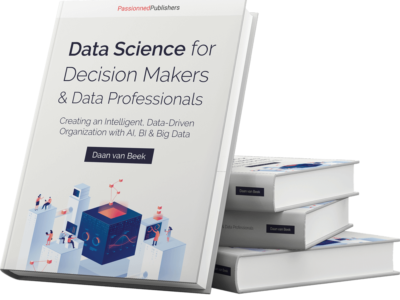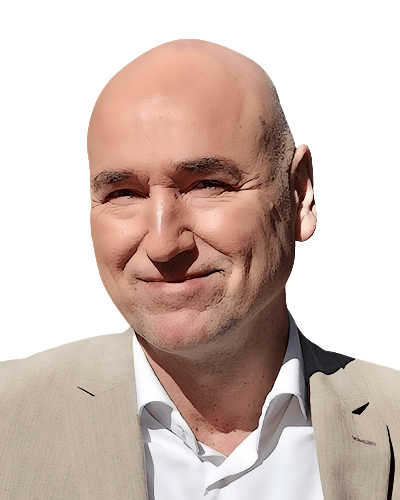Never underestimate the power of data-driven innovation
‘Organizations massively underestimate the power of data-driven innovation.’ states Prof. Dr. Frans Feldberg, professor of Data-Driven Innovation at the Vrije Universiteit Amsterdam. According to him, there is still a world to be conquered. The use of data and analytics to improve existing business is commonplace, but too few organizations exploit the opportunities to truly innovate by developing new data-driven products and services. ‘You really don’t have to explain to managers anymore how important data is. For example, most organizations use data to optimize the supply chain to maximize the customer experience. The fact that you can also use data to stay relevant by developing new business models is a real eye-opener for many organizations.’
The enormous potential of data-driven innovation
Frans Feldberg is an inspired professor who has an eye for the unprecedented potential that Artificial Intelligence (AI) and data-driven innovation have to offer. Not only for the medical, energy, and retail sectors but also for many others. Four years ago, he gave a dazzling TEDx presentation titled “Prediction machines: How can AI help us“. Since then, the potential applications of AI have only increased thanks to exponentially increased computing power, data portability, and interconnectivity. DNA researchers and radiologists, ChatGPT, Netflix, and so on are all making grateful use of it. Since Feldberg recently joined the jury of the Dutch BI & Data Science Award, we asked him for an update. How will AI solve our world’s problems?
Moore’s law
Feldberg: “Intel founder Gordon Moore’s law (doubling the number of transistors that fit on a computer chip every two years) still applies”. And artificial intelligence, according to the Scientific Council for Government Policy (WRR), is not just another technology. It is a systems technology. It is best compared to the rise of the steam engine, electricity, the internal combustion engine, and the computer. These are systems technologies that lead to unexpected applications. For example, Edison could never have predicted that electricity would eventually be used for brushing teeth. A characteristic of a systems technology is that it is ubiquitous and it is becoming cheaper and cheaper. AI is in your phone, car, washing machine, road surfaces, lamps, and so on. A systems technology provides a platform, a fertile ground for all kinds of new innovations.
A characteristic of a systems technology is that it is ubiquitous and increasingly cheap.
Feldberg gives a concrete example: ‘Algorithms, according to scientifically validated benchmarks, now beat humans when it comes to detecting suspicious tissue not yet visible to the human eye. The fact that the algorithm beats humans is in itself not surprising because an X-ray has as many as 4,000 shades of gray that the human eye can never distinguish all of them. When it comes to recognizing patterns in data, computers beat humans: algorithms recognize certain patterns in seconds that humans easily overlook.’
But developments in the medical sector go much further, according to Feldberg. Think, for example, of “personalized medicine,” customized drug treatments in which you can continuously monitor tumor developments almost at the cellular level. These treatments are only possible thanks to AI and increased computing power. Thus, more and more data are being used in medical practice to increasingly support decision-making.
Another example: the ICU fulfills a crucial function in the entire hospital logistics. The discharge timing therefore must be carefully considered. If you discharge someone from intensive care too early, the risk of readmission or mortality due to complications increases. An unnecessarily long stay in the hospital costs money and strains your bed capacity. There are algorithms that support intensivists in deciding what is the best discharge time. Intensivist Paul Elbers of Amsterdam UMC is researching this.
Hybrid models
 Still, according to Feldberg, this does not mean that hospitals will henceforth blindly rely on algorithm judgment. On the contrary. He himself believes in hybrid models, in which algorithms support humans in decision-making. Patient meetings and transfer meetings still take place daily in hospitals. When transferring or discharging, doctors first make the decision themselves. Then they see what the algorithm says. If the recommendations differ, another meeting is held. However, the algorithm is fed with all available data, such as blood pressure and heart rate measurements, reports from nurses, doctors, and so on.
Still, according to Feldberg, this does not mean that hospitals will henceforth blindly rely on algorithm judgment. On the contrary. He himself believes in hybrid models, in which algorithms support humans in decision-making. Patient meetings and transfer meetings still take place daily in hospitals. When transferring or discharging, doctors first make the decision themselves. Then they see what the algorithm says. If the recommendations differ, another meeting is held. However, the algorithm is fed with all available data, such as blood pressure and heart rate measurements, reports from nurses, doctors, and so on.
Thanks to reinforcement learning, the algorithm thus becomes smarter and smarter. In the Radiology Department, the radiologist writes the report. Perhaps in the future, you can have the reports produced by Chat GPT, we are not that far yet, but great strides are being made in diagnostics. Humans play a crucial role in decision-making, of course, you don’t want to leave bad news calls to a computer either. Thanks to increased computing power, humans and technology are therefore working together more and more intensively within hybrid models.’ Also at the conference The Future of Medical Imaging and Radiotherapy, where Feldberg was one of the speakers, it became clear that data-driven innovation and AI are playing an increasing role in the detection and treatment of more and more diseases.
Despite the opportunities Feldberg sees, he also does have an eye for the downsides of AI and advocates for responsible AI and critical reflection on the influence and role of big tech companies. The ease with which people just give away their data to companies like Facebook and TikTok amazes him. If the product is free, you are the product, he warns. Passionned Academy therefore offers data analytics trainings, including an AI-focused one, to make you aware of the possibilities and risks of AI.
The great prediction machines
Inspired in part by A. Agrawal’s book “Prediction Machines,” Feldberg sees a big role for predictive algorithms. Prediction is filling in information you don’t have based on the information you do have. That may sound cryptic. But think about putting together a puzzle. As you progress, the number of missing pieces of the puzzle gets smaller and smaller, making laying it easier and easier. Basically, ChatGPT works this way, too. It is one big prediction machine that looks for the right answer. He does make an important caveat here. “I see a hybrid model emerging where the algorithm supports decision-making and humans ultimately decide.
Feldberg therefore sees the fact that we now have algorithm records that municipalities, provinces, and government agencies are required to keep as a logical and good development. But the necessary legislation is also coming at us from Brussels: Think of the Digital Services Act, the Digital Market Act, and the Data Act. These laws and regulations combined with ethical guidelines will help shape data-driven innovation in a responsible way. It may help if algorithms are given some sort of seal of approval. There are still major challenges here, though. ‘Some algorithms are black boxes and other algorithms are only really understood by a limited number of people around the world.’ According to him, that doesn’t mean you should just take Explainable AI and Responsible AI with a grain of salt. ‘As a society, we need to think carefully about what we want with AI and what should be the guiding principles in this.’ The aforementioned WRR report also gives clear recommendations for this.’
Dutch BI & Data Science Award 2024
Frans Feldberg recently joined the jury of the Dutch BI & Data Science Award. Based on his expertise as a professor, he and the other members of the jury will assess the projects of the nominees and the final candidates, especially on the data-driven, innovative character of their entries. The nomination period for the Dutch BI & Data Science Award 2024 is now open. This award, given every two years to the “Smartest Organization of the Netherlands,” is a highly sought-after prize that has been presented since 2005. In principle, any organization with more than 50 employees in the Netherlands may compete. This year, the prestigious award will be presented live on Thursday, December 7, 2024, during a professional conference where the finalists will be put in the spotlight and there will be plenty of room for networking. If your company is Dutch, you can already nominate your organization for the Dutch BI & Data Science Award 2024. Check the conditions or contact us.
Washing machine with WiFi connection
Feldberg also sees all kinds of data-driven innovations emerging in the energy sector. He briefly touches on them. What about microgrids, a mini version of a classic power grid, and smart grids where smart innovations and data play a leading role? A washing machine with a WiFi connection is no longer a novelty. People set up their own energy cooperatives. At the macro level, energy supply and demand are matched using AI to prevent congestion in the energy grid. Algorithms indicate when preventive maintenance is needed. And so on and so forth.
The rise of subscription-based services
 The power of data-driven innovation is readily apparent in the retail sector, according to Feldberg. By analogy with cloud computing, you see all kinds of new subscription-based services emerging in this sector, which may or may not involve collecting and processing a huge amount of valuable customer and usage data via the Internet of Things (IoT). At Coolblue, a Dutch e-commerce company, for example, you can now purchase white goods such as washing machines, refrigerators, and so on in a full-service model. You then pay a fixed monthly amount for use, maintenance, detergents, et cetera. Established parties such as Bosch and Siemens are also coming up with new data-driven products and services. BlueMovement, for example, is capitalizing on the trend toward sustainability, consumer convenience, refurbishing, and recyclability of appliances with new rental and lease plans.
The power of data-driven innovation is readily apparent in the retail sector, according to Feldberg. By analogy with cloud computing, you see all kinds of new subscription-based services emerging in this sector, which may or may not involve collecting and processing a huge amount of valuable customer and usage data via the Internet of Things (IoT). At Coolblue, a Dutch e-commerce company, for example, you can now purchase white goods such as washing machines, refrigerators, and so on in a full-service model. You then pay a fixed monthly amount for use, maintenance, detergents, et cetera. Established parties such as Bosch and Siemens are also coming up with new data-driven products and services. BlueMovement, for example, is capitalizing on the trend toward sustainability, consumer convenience, refurbishing, and recyclability of appliances with new rental and lease plans.
Partly because of IoT, a completely new dynamic is emerging. In the automotive industry, options are also increasingly being sold as subscriptions. BMW, for example, makes you pay 19 euros a month for seat heating. Although there are also critical voices from consumer organizations, for the automotive industry, data-driven products and services could yet become the solid basis of the business model, according to the professor. The parent company behind Peugeot, Citroën, and Opel thinks it will generate as much as 20 billion euros a year starting in 2030. By the way, this is not just about subscriptions to hardware options such as power, but also to software options such as navigation services and parking assistance.
The Artificial Intelligence handbook This complete Artifical Intelligence book covers the entire spectrum of making organizations more intelligent. It offers you a perfect framework for structurally tackling and implementing organizational improvement with AI, Data Science and Big Data.
This complete Artifical Intelligence book covers the entire spectrum of making organizations more intelligent. It offers you a perfect framework for structurally tackling and implementing organizational improvement with AI, Data Science and Big Data.
ChatGPT did not come out of the blue
The effect of Moore’s law is readily apparent when it comes to ChatGPT, according to Feldberg. We now have the computing power to analyze massive amounts of data, discover patterns in it, and derive knowledge from it. Open AI was founded back in 2015, and the first version of ChatGPT dates back to 2018. ChatGPT is also essentially one very large prediction machine that, based on the question, tries to predict as best as possible which texts match best and formulates an answer based on that. This requires enormous computing power that does come with high energy consumption and extra CO2 emissions. The first critical comments are already echoing.
The advance of ChatGPT, despite a ban by some countries, is unstoppable. Google’s business model, meanwhile, is under pressure. ‘Because if you can choose, what would you rather have? A fully written out to-the-point answer to your question, or a list of ten search results, the first five of which are sponsored by Google and/or other commercial parties?’ Although Feldberg closely follows global AI trends and data-driven innovation, he also has an eye for regional developments. For example, he is involved in the regional initiative Data Science Alkmaar from VU University Amsterdam as a co-founder. According to him, this is extremely important to exploit the opportunities and possibilities offered by data and artificial intelligence for the benefit of regional growth and development in North Holland.
Data-driven innovation also does not mean reinventing everything, according to Feldberg. Valuable and proven concepts such as ideation and design thinking are still applicable. When the winner of the Dutch BI & Data Science Award 2022 Pon introduced the startup Lensor for automatic damage detection, the idea arose during brainstorming to use artificial intelligence not only on Pon’s cars but also on company cars and rental cars from external parties. That sounds logical, but you just have to come up with it…
The essence of ‘Resourcing with data’
Within the KIN Research Department in the School of Business and Economics, Feldberg is a professor working with colleagues on research in the area of data-driven business model innovation. For example, Wendy Günther, a doctoral student working under Dr. Feldberg, investigated with colleagues how organizations create data-driven value propositions by reusing data in different contexts. In an award-winning article, “Resourcing with data: Unpacking the process of creating data-driven value propositions,” they describe how organizations can create value with data.
Computers can’t think
Data-driven innovation is a necessary condition for organizations to stay relevant. Yet Feldberg also emphatically makes some comments. “Computers cannot think. They don’t have imagination, or empathy, for example. If we think computers can think, and we also start using them to think for us, because we think they can think, then things will go wrong!’ Computers, algorithms, and chatbots can do certain cognitive processes, such as calculation, and pattern recognition, much better than humans can. But that is still very different from thinking. So it is very important that we think about this carefully and develop and apply legal and ethical frameworks to ensure responsible use of AI,’ Feldberg concluded.



